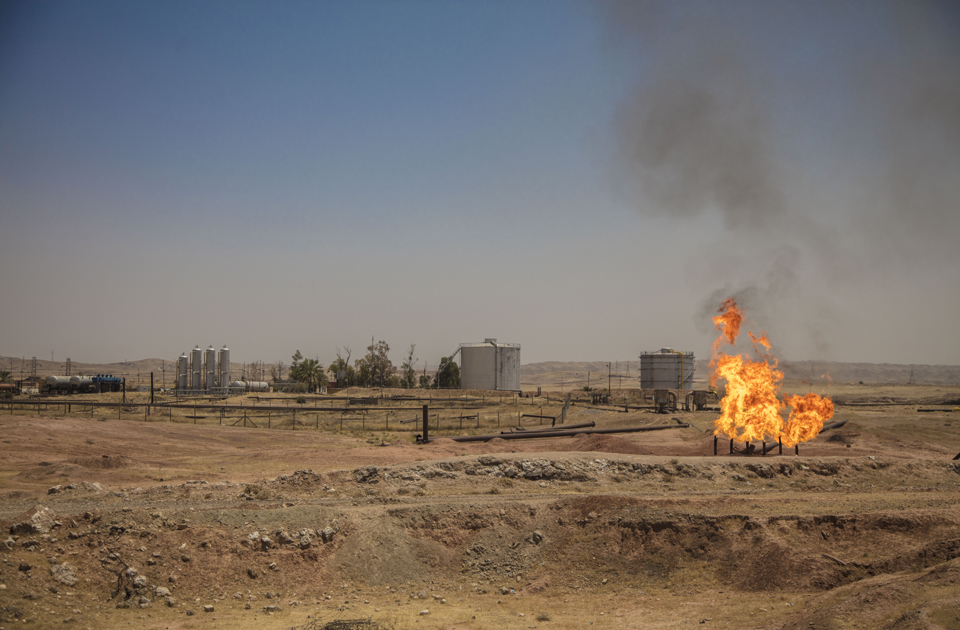Kirkuk crude oil is mostly sold domestically and supplied to Iraqi refineries, after exports through the Kurdistan Regional Government (KRG) pipeline to Ceyhan port in Turkey were suspended.
Turkey has suspended crude oil exports from the Iraqi Kurdistan Region IKR and Kirkuk for more than two months, despite Iraq's demands to normalize oil exports, but the date of resumption is unknown.
"The suspension of oil exports will not harm the people of Kirkuk because most of the oil produced in the province is given to refineries," Farhad Hamza, chief engineer of the Northern Oil Company, told KirkukNow.
Hamza said Kirkuk’s crude oil is sent to Kar, Qaywan, Gayra, Hadisa, Beji and other refineries in different Iraqi provinces.
In April, there were no exports from Kirkuk oil fields to Turkey, while in March this year, exports reached more than 1.7 million barrels of crude oil, earning more than $124 million.
"Oil production in the oil fields has not stopped due to the suspension of exports. Now, as before, 350,000 barrels of oil are produced daily and most of it goes to refineries,” Hamza added.
The Iraqi government earlier this month renewed an agreement with Jordan to export 10,000 barrels of Kirkuk crude oil daily by tanker.
350,000 barrels of crude oil are produced daily in Kirkuk as usual
The chief engineer of the Northern Oil Company explained that they can treat the oil produced in Kirkuk, even if it is not exported, because there are many warehouses to store oil and when they are full, there is a plan how to consume it locally.
Kirkuk crude oil was exported daily through the (KRG) oil pipeline to Turkey, yet has been suspended since March 25, 2023, following a decision of the International Court of Arbitration in Paris against Turkey.
Iraq's complaint is over disputes between Baghdad and Erbil over the production and export of crude oil, which has remained pending for years.
On April 4, 2023, the two federal governments signed an agreement to resume oil exports through the (KRG) pipeline to Turkey until the approval of the Oil and Gas Law yet Iraq and Turkey have not reached an agreement how and when to resume exports.
Ali Hammadi, the deputy governor for technical affairs, was concerned that the suspension of exports would affect oil production and reduce Kirkuk's petrodollar budget.
According to the Iraqi government's agenda, 5% of the petrodollar budget will be spent on oil-producing provinces. Kirkuk has previously expressed concerns about the amount of money allocated by Baghdad government.
Hammadi believes the suspension of exports will not directly affect the people of Kirkuk, but may have consequences for oil production, as the current amount of production is only for national refineries.
In April, there were no exports from Kirkuk oil fields to Turkey, while in March hit over 1.7 million barrels only, half of last February exports, while its revenues exceeded $126 million.
Crude oil exports from the Kirkuk fields through pipelines and tanks during the last year exceeded 29.5 million barrels, with revenues exceeding $2.8 billion.
There are five main crude oil producing fields in Kirkuk province; Avana, Bay Hassan, Baba Dome, Jambur and Khabaza, under the control of the Iraqi Government’s North Oil Company.
Kirkuk, Iraq’s second largest reserves, located 238 kilometers north of Baghdad, is an ethnically mixed province for 1,7 million Arabs, Kurds and Turkmens. It has long been at the center of disputed territories between Baghdad and the Erbil.





